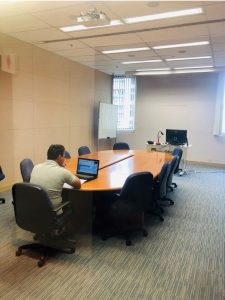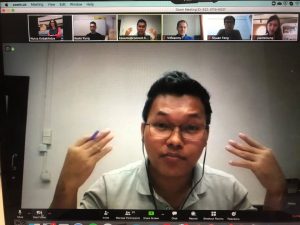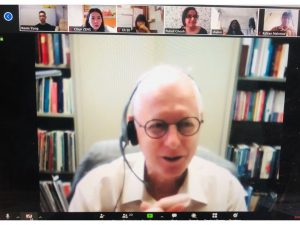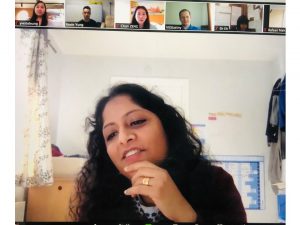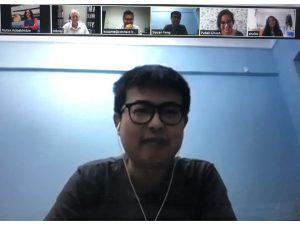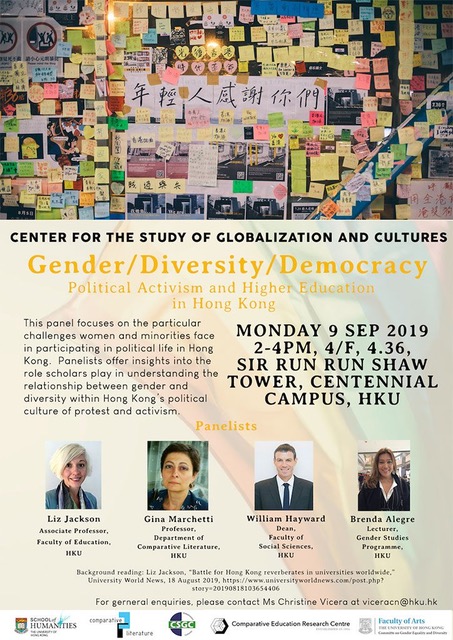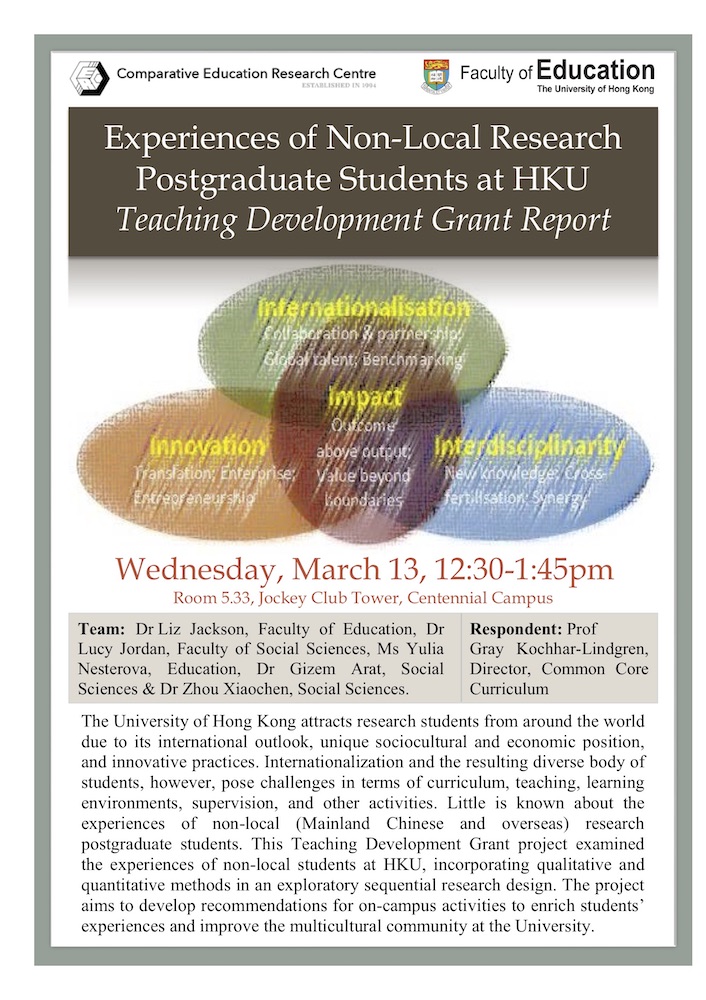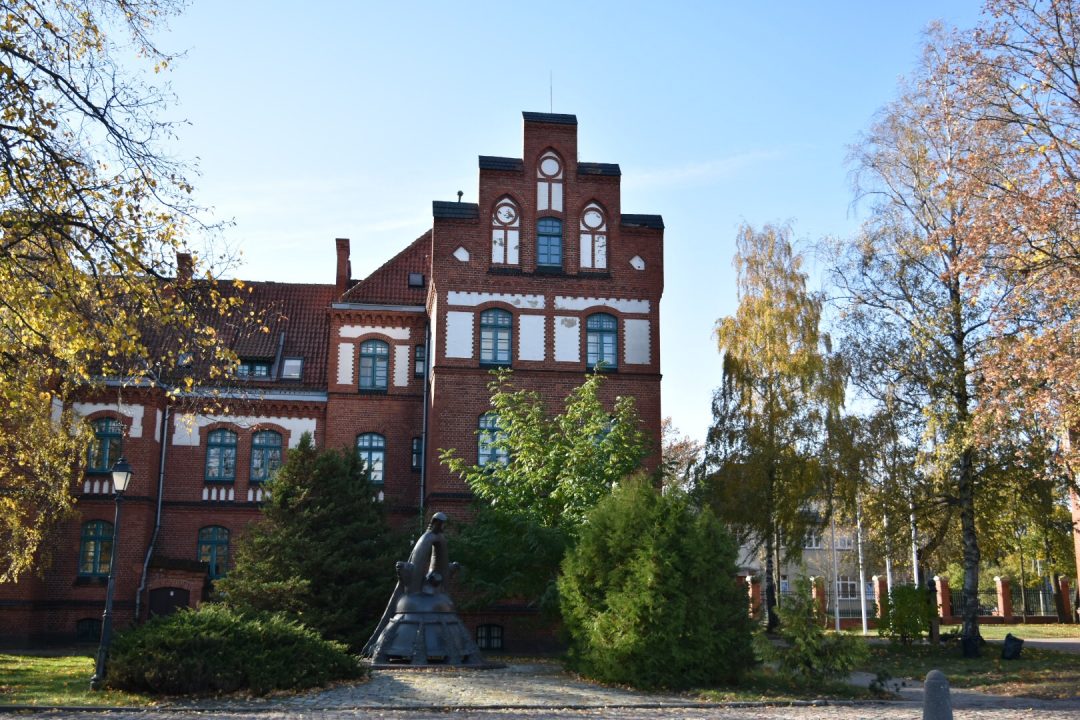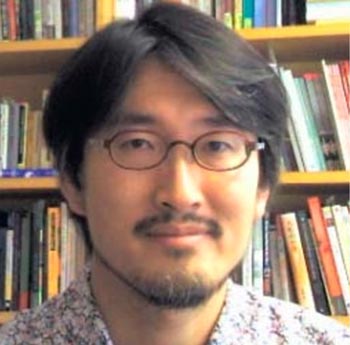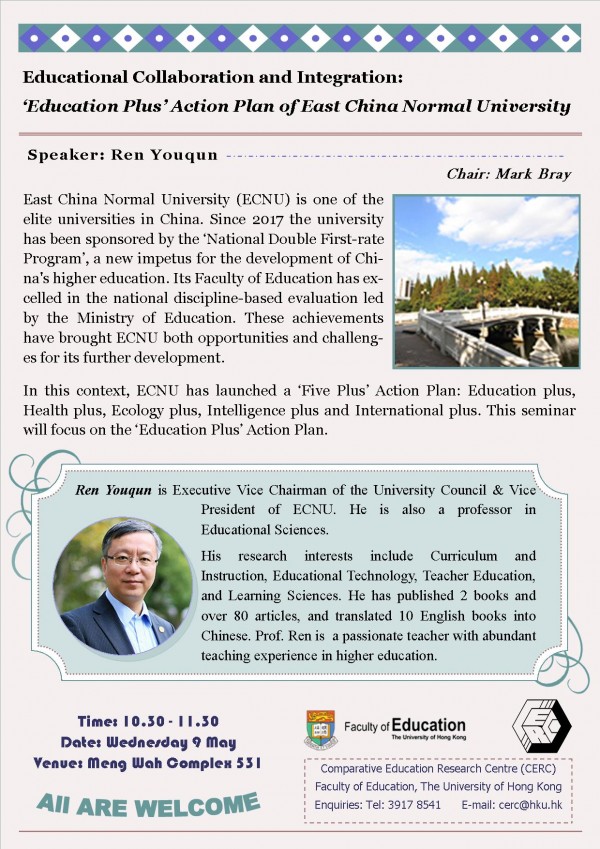Peter Suante (a PhD candidate at HKU) made a power point presentation on his experiences of field research in Myanmar. The title of Peter’s presentation was: Reflections on Private Tuition Field Research in Myanmar. Dr Nutsa Kobakhidze facilitated the meeting. Prof Mark Bray, Dr Ora Kwo, Dr Kevin Yung, Dr Zhang Wei, Dr Vít Šťastný, Dr Rafsan Mahmud attended the meeting together with many current PhD and MEd students, as well as past members of the SIG connecting from different parts of the world.
Panel Discussion: Gender/Diversity/Democracy: Political Activism and Higher Education in Hong Kong
Panelists: Liz Jackson (Associate Professor, Faculty of Education, HKU), Gina Marchetti (Professor, Department of Comparative Literature, HKU), William Hayward (Dean, Faculty of Social Sciences, HKU), Brenda Alegre (Lecturer, Gender Studies Programme, HKU)
This panel focuses on the particular challenges women and minorities face in participating in political life in Hong Kong. Panelists offer insights into the role scholars play in understanding the relationship between gender and diversity within Hong Kong’s political culture of protest and activism.
Date: 9 September, 2019 (Monday)
Time: 2:00 pm – 4:00 pm
Venue: 4.36, 4/F, Sir Run Run Shaw Tower, Centennial Campus, HKU
Background reading: Liz Jackson, “Battle for Hong Kong reverberates in universities worldwide,” University World News, 18 August 2019
All are welcome.
For enquiries, please contact Christine Vicera at viceracn@hku.hk
Experiences of Non-Local Research Postgraduate Students at HKU Teaching Development Grant Report
Team: Dr Liz Jackson, Faculty of Education, Dr Lucy Jordan, Faculty of Social Sciences, Ms Yulia Nesterova, Education, Dr Gizem Arat, Social Sciences & Dr Zhou Xiaochen, Social Sciences.
Respondent: Prof Gray Kochhar-Lindgren, Director, Common Core Curriculum
The University of Hong Kong attracts research students from around the world due to its international outlook, unique sociocultural and economic position, and innovative practices. Internationalization and the resulting diverse body of students, however, pose challenges in terms of curriculum, teaching, learning environments, supervision, and other activities. Little is known about the experiences of non-local (Mainland Chinese and overseas) research postgraduate students. This Teaching Development Grant project examined the experiences of non-local students at HKU, incorporating qualitative and quantitative methods in an exploratory sequential research design. The project aims to develop recommendations for on-campus activities to enrich students’ experiences and improve the multicultural community at the University.
Lithuanian higher education in the 21st century: Post-Soviet remnants, European integration, and new challenges and opportunities
In the past 28 years since regaining independence from the Soviet Union, Lithuania has transformed its society and the higher education system. Since joining the European Union in 2004, Lithuanian higher education has aligned its policies and practices with the EU. This integration created many opportunities as well as some challenges. In this presentation, we will examine how the system of higher education in Lithuania has developed from the Soviet to current times and how the integration into the European Union higher education community has created new possibilities for Lithuanian scholars.
In this presentation, the speakers will discuss the effects of both the past and current developments and will share the contemporary needs of the Lithuanian higher education community. The topics to be explored include:
- Institutional autonomy of the academic community and the interaction with state needs;
- Development of research, science, and innovation in Lithuania;
- Challenges in human resources
- Student preparation for higher education studies;
- Support for under-privileged social groups
The current research project, “Researching Specialist Training to Provide Holistic Help to People with Disabilities in the Health Care System while Improving Researcher Competencies” will be used as a telling case to ground the discussions of the history, developments, and needs in Lithuanian higher education.
Chair: Dr. Susan Bridges. Discussants: Dr. Liz Jackson, Dr. Anatoly Oleksiyenko.
Presenters:

Prof. Audra Skukauskaitė is a senior researcher at Klaipeda University, Lithuania, as well as an independent researcher and research consultant for the Lemelson-MIT program at the Massachusetts Institute of Technology in the USA. Dr. Skukauskaitė resides in the US and serves as an adjunct professor of qualitative research methodologies in the College of Integrated Medicine and Health Sciences and the College of Social Sciences at Saybrook University in California, USA. Dr. Skukauskaitė has conducted seminars on varied qualitative research methodologies in Lithuania, Finland, Sweden, Australia and the US and has taught writing for academic publication in English for international scholars. Dr. Skukauskaitė has published numerous research articles and book chapters focusing on ethnography, research epistemology and transparency, transcribing and interviewing, as well as on the teaching and learning of research. Dr. Skukauskaitė serves on editorial boards of four journals and has an extensive experience of reviewing and supporting the writing of manuscripts for academic publications. Over the past 15 years, Dr. Skukauskaitė has served in multiple leadership positions in the American Educational Research Association. Currently, she serves as chair of the Qualitative Research section of the Measurement and Research Methodology Division (D) as well as chair of the John. J. Gumperz Lifetime Achievement Award committee of the Language and Social Processes SIG at AERA.
As a researcher, research consultant, and professor of research methodologies and qualitative research, over her career, Dr. Skukauskaitė has worked with diverse scholars and students across disciplines to develop, conduct, and support research studies in complex educational and transdisciplinary environments. Her recent work has explored invention education and ways of utilizing ethnographic and discourse-based research epistemologies to examine complex processes of constructing and publishing research in science and engineering education. Dr. Skukauskaitė’s overarching interests focus on ways of utilizing research-based ways of thinking and knowing to develop deeper understandings and trustworthy representations of the complex processes and practices of learning, teaching, and living in dynamic academic, socio-historical, economic, and cultural environments.
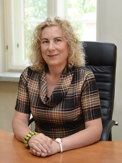
Prof. Ingrida Baranauskienė is a professor of Education and head researcher at the Faculty of Health Sciences of Klaipėda University (Lithuania). For over ten years, the professor has been the dean of the Faculty of Social Welfare and Disability Studies of Šiauliai University. The field of her scientific interests: preconditions for success in social participation of people with disabilities. I. Baranauskienė is a co-author of two monographs on the participation of people with disabilities in the labour market, an initiator of five scientific studies presenting research on social exclusion. She is an author of many scientific articles on disability research. To make an impact on active practice of Lithuania and other European countries, the professor takes an active part in international projects, initiates and implements them. I. Baranauskienė was awarded the title of the honorary doctor of the university “Ukraine” for her practical activities and support to the Ukrainian system of higher education. The professor has been elected as an expert in the area of Education Science in Latvian Academy of Sciences for a maximum term of three years. I. Baranauskienė is the editor-in-chief of the journal “Social Welfare: Interdisciplinary Approach”, member of editorial boards of several other scientific journals. Currently, in cooperation with other scientists, I. Baranauskienė is investigating the accessibility of the health care system to Lithuanian people with disabilities through participation in the high-level scientific research project “Researching Specialist Training to Provide Holistic Help to People with Disabilities in the Health Care System while Improving Researcher Competencies”. Judith Green, professor emerita of the University of California in Santa Barbara, is the leader of this project. The project is funded by the Research Council of Lithuania jointly with the European Union.
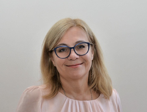
Prof. Liudmila Rupšienė is a professor and senior researcher at Klaipeda University. The main scientific interest – research methodology. Author of a number of books with three of them focusing on research methodology: Methodology of Qualitative Research Data Collection (2007), Methodology of Qualitative Research (2008), Educational Experiment (2016). Published more than 100 scientific articles, made around 100 presentations in scientific conferences in Lithuania and abroad (Latvia, Poland, Spain, Denmark, Russia, USA and many other countries). Member or leader of international and national projects (ERASMUS+ and others), Lithuanian principal investigator in European scientific project ESPAD. Scientific supervisor of doctoral students, supervised for 7 defended doctoral dissertations, chairwoman, member or opponent of around 60 doctoral dissertation defense boards, member of habilitation procedure board, member of the committee for the joint education doctorate of four Lithuanian universities consortium (since 2011). Expert of the State Studies Foundation, Centre for Quality Assessment in Higher Education, the president of Lithuanian Educational Research Association, council member of European Educational Research Association. Member of editorial boards of two Lithuanian academic journals.
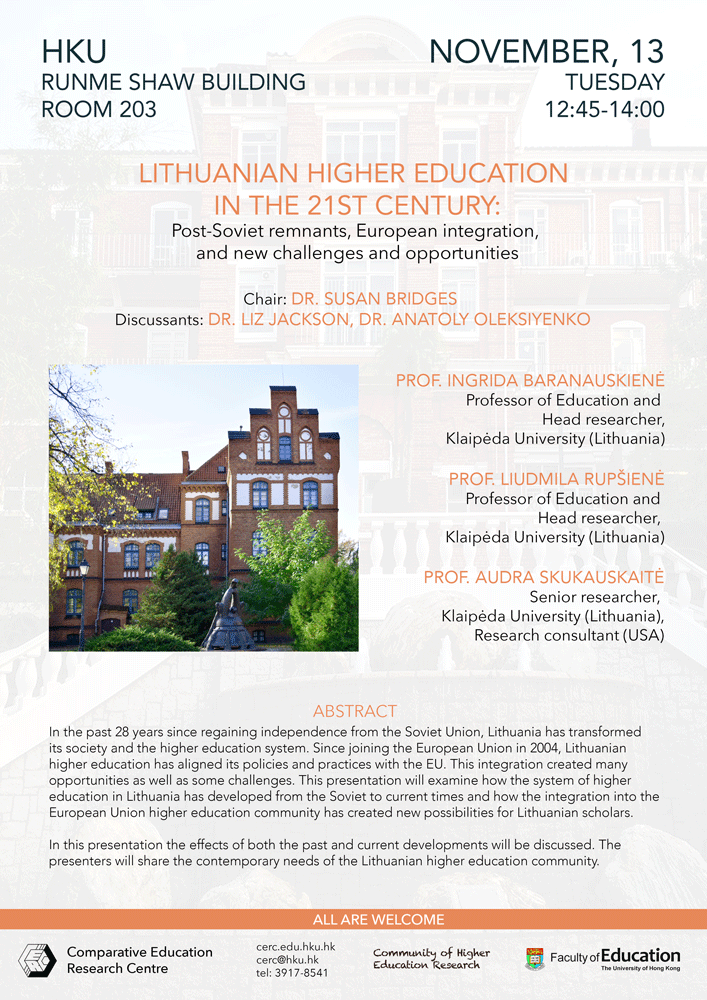
Date: Tuesday, 13 November 2018.
Time: 12:45 – 14:00.
Venue: Room 203, Runme Shaw Building.
All are welcome!
Innovation in Tertiary Institutions in New Zealand: The conditions for the future collaborations for Chinese/Hong Kong and New Zealand institutions
Innovation in Tertiary Institutions in New Zealand: The conditions for the future collaborations for Chinese/Hong Kong and New Zealand institutions
International Status Anxiety and Higher Education – The Soviet Legacy in China and Russia
International Status Anxiety and Higher Education – The Soviet Legacy in China and Russia
Beyond comforting histories: The colonial/imperial entanglements of the International Institute, Paul Monroe and Isaac L. Kandel at Teachers College, Columbia University
Dear CERC members,
You’re cordially invited to the next CERC seminar co-hosted with the Faculty of Education on coming Thursday, 04 October 2018 at 12:45 – 14:00 in Room 203 of Runme Shaw Building.
Beyond comforting histories: The colonial/imperial entanglements of the International Institute, Paul Monroe and Isaac L. Kandel at Teachers College, Columbia University
CERC Seminar: Shadow Education in Myanmar Private. Supplementary Tutoring and its Policy Implications
Dear CERC members,
You’re cordially invited to the next CERC seminar co-hosted with the Faculty of Education on coming Tuesday, 18 September 2018 at 12:45 – 14:00 in Room 204 of Runme Shaw Building.
Later this month the authors will discuss the findings with policy-makers in Myanmar’s Ministry of Education. They will value suggestions during this CERC seminar on the ways to highlight the core issues most effectively.
The Making of Indigeneity: Interrogating Uses and Abuses of the Concept of ‘Indigenous’
By Dr Licho (Licho) Lopez Lopez
Chair: Yulia Nesterova
In The Making of Indigeneity, Lopez interrogates how what is “indigenous,” as a category of diversity, emerged, has been made, remade, and is taken up to fund discourses of multiculturalism and intercultualism. Through historical and ethnographic classroom research Lopez devices eventalizing as a methodological approximation to educational research at the limits of “the educational” to interrogate how liberal and progressive propositions for educating the “Indian” generate particular ways of organizing difference ostensibly meant to serve historically marginalized indigenous peoples. Asking questions of the historical and scientific involvement of anthropology, sociology, law, photography, and education in the making of indigenous as a kind of people, Lopez accounts for the aspirations, activities, and tactics that perpetuate violence on indigenous lives limiting their futurity as un-fixed being.
Ligia (Licho) Lopez Lopez is a McKenzie Fellow and Lecturer at the University of Melbourne in Australia. Her research interests are interrogating diversity, visual studies of difference, youth popular visual cultures, and Black and Brown affect as curricular trans-formation. Licho is the author of The Making of Indigeneity, Curriculum History and the Limits of Diversity (Routledge, 2017). Her work has appeared in Knowledge Cultures (Australia), PROFESSORADO (Spain), Journal of Curriculum and Theorizing (USA), and The British Journal of Sociology (UK).
Date: Thursday August 23, 2018
Time: 12:00 – 13:15
Venue: Room 203, Runme Shaw Building
ALL ARE WELCOME!
Educational Collaboration and Integration: ‘Education Plus’ Action Plan of East China Normal University
By Ren Youqun
Chair: Mark Bray
Ren Youqun is Executive Vice Chairman of the University Council & Vice President of ECNU. He is also a professor in Educational Sciences.
His research interests include Curriculum and Instruction, Educational Technology, Teacher Education, and Learning Sciences. He has published 2 books and over 80 articles, and translated 10 English books into Chinese. Prof. Ren is a passionate teacher with abundant teaching experience in higher education.
Abstract: East China Normal University (ECNU) is one of the elite universities in China. Since 2017 the university has been sponsored by the ‘National Double First-rate Program’, a new impetus for the development of China’s higher education. Its Faculty of Education has excelled in the national discipline-based evaluation led by the Ministry of Education. These achievements have brought ECNU both opportunities and challenges for its further development.
In this context, ECNU has launched a ‘Five Plus’ Action Plan: Education plus, Health plus, Ecology plus, Intelligence plus and International plus. This seminar will focus on the ‘Education Plus’ Action Plan.
Time: 10.30 – 11.30
Date: Wednesday 9 May
Venue: Meng Wah Complex 531
All are welcome!
Click here for the poster.


